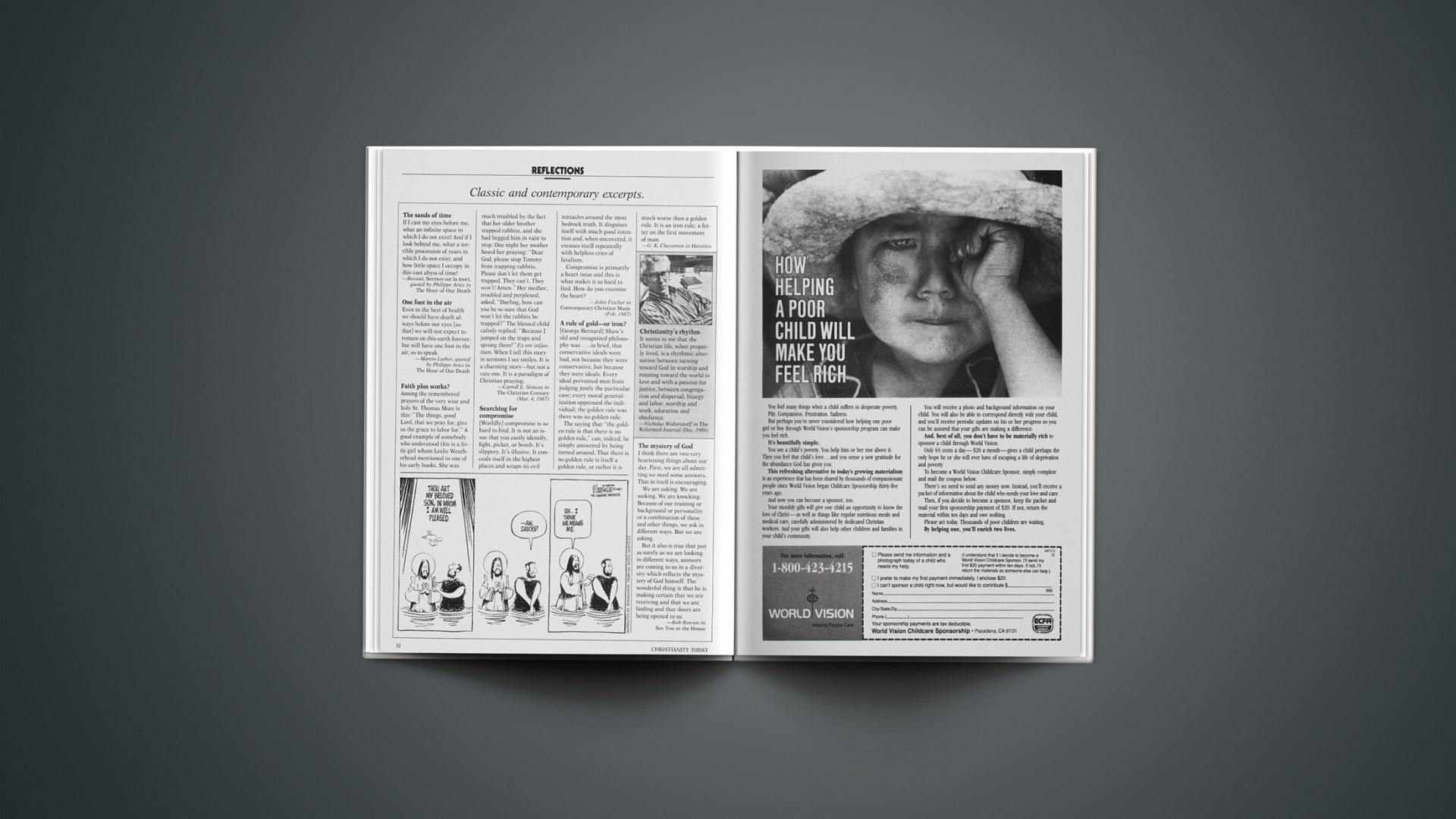The sands of time
If I cast my eyes before me, what an infinite space in which I do not exist! And if I look behind me, what a terrible procession of years in which I do not exist, and how little space I occupy in this vast abyss of time!
—Bossuet, Sermon sur la mort,
quoted by Philippe Aries in
The Hour of Our Death
One foot in the air
Even in the best of health we should have death always before our eyes [so that] we will not expect to remain on this earth forever, but will have one foot in the air, so to speak.
—Martin Luther, quoted
by Philippe Aries in
The Hour of Our Death
Faith plus works?
Among the remembered prayers of the very wise and holy St. Thomas More is this: “The things, good Lord, that we pray for, give us the grace to labor for.” A good example of somebody who understood this is a little girl whom Leslie Weatherhead mentioned in one of his early books. She was much troubled by the fact that her older brother trapped rabbits, and she had begged him in vain to stop. One night her mother heard her praying: “Dear God, please stop Tommy from trapping rabbits. Please don’t let them get trapped. They can’t. They won’t! Amen.” Her mother, troubled and perplexed, asked, “Darling, how can you be so sure that God won’t let the rabbits be trapped?” The blessed child calmly replied: “Because I jumped on the traps and sprung them!” Ex ore infantium. When I tell this story in sermons I see smiles. It is a charming story—but not a cute one. It is a paradigm of Christian praying.
—Carroll E. Simcox in
The Christian Century
(Mar. 4, 1987)
Searching for compromise
[Worldly] compromise is so hard to find. It is not an issue that you easily identify, fight, picket, or bomb. It’s slippery. It’s illusive. It conceals itself in the highest places and wraps its evil tentacles around the most bedrock truth. It disguises itself with much good intention and, when uncovered, it excuses itself repeatedly with helpless cries of fatalism.
Compromise is primarily a heart issue and this is what makes it so hard to find. How do you examine the heart?
—John Fischer in
Contemporary Christian Music
(Feb. 1987)
A rule of gold—or iron?
[George Bernard] Shaw’s old and recognized philosophy was … in brief, that conservative ideals were bad, not because they were conservative, but because they were ideals. Every ideal prevented men from judging justly the particular case; every moral generalization oppressed the individual; the golden rule was there was no golden rule.
The saying that “the golden rule is that there is no golden rule,” can, indeed, be simply answered by being turned around. That there is no golden rule is itself a golden rule, or rather it is much worse than a golden rule. It is an iron rule; a fetter on the first movement of man.
—G. K. Chesterton in Heretics
Christianity’S Rhythm
It seems to me that the Christian life, when properly lived, is a rhythmic alternation between turning toward God in worship and running toward the world in love and with a passion for justice, between congregation and dispersal, liturgy and labor, worship and work, adoration and obedience.
—Nicholas Wolterstorff in The
Reformed Journal (Dec. 1986)
The mystery of God
I think there are two very heartening things about our day. First, we are all admitting we need some answers. That in itself is encouraging.
We are asking. We are seeking. We are knocking. Because of our training or background or personality or a combination of these and other things, we ask in different ways. But we are asking.
But it also is true that just as surely as we are looking in different ways, answers are coming to us in a diversity which reflects the mystery of God himself. The wonderful thing is that he is making certain that we are receiving and that we are finding and that doors are being opened to us.
—Bob Benson in
See You at the House










